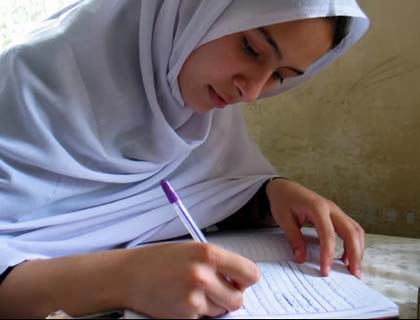On the ground realities, Afghanistan has long had one of the poorest education records in the world, with a low rate of school attendance and a high percentage of illiteracy and still it persists. Today, the world is moving so fast with intensive focus on their educational system and educational quality that lead them towards achieving the very particular and most desiring goals of theirs we can ever imagine. Reading the current touchy circumstances that have dominated Afghanistan, it seems very challenging to find the possibilities for developing the best educational system, avoiding clashes and disunity. It is about time, we all have to come together acting to build a better Afghanistan on the basis of education since the high rate of Illiteracy in Afghanistan is appearing to be the first biggest hurdle to stability and civilization and it's the one and the most major weaknesses of ours which constantly allows other countries to feel pity for us in every step. We can not afford to be pitied on any more due to lack of proper education.
Perhaps, literacy, peace, security, and democracy are the foundations for the development of a country; all areas that are strengthened by the existence of a self-sustaining critical mass of literate and productive citizens. However, more than three decades of conflict in Afghanistan have created generations of people who have lost out educational opportunity. As a result, Afghanistan has one of the highest illiteracy rates in the world today, and according to the National Risk and Vulnerability Assessment (NRVA) the estimated national adult literacy rate (aged 15 and above) is 26 percent, with 12 percent for women and 39 percent for men. In rural areas, where approximately 74 percent of all Afghans reside, the situation is more acute, with an estimated 93 percent of women and 65 percent of men lacking basic reading and writing skills.
The magnitude of challenges that stand in the way of achieving the national goals in Afghanistan remains extremely high following the long and tragic history of conflict that have devastated nearly every facet of society.
After ten-long years in Afghanistan, the success of the US-led international community and reconstruction efforts is subject to much debate. Most accounts are highly pessimistic. Large swaths of the countryside remain ungoverned and uncontrolled. The Taliban, who were quickly defeated in the fall of 2001 and subsequently fled away returning back in recent years. Since 2005, the Taliban have returned to Afghanistan to make territorial gains, replacing local governments and traditional ruling authorities and challenging the Afghan government and its international allies and appears in different ways by their brutal insurgency.
Despite Afghanistan's grim outlook, the international community's effort and existence in Afghanistan offers the hope of promising a healthy future for each Afghan. The very current situation subjugating Afghanistan is the one that should be read by anyone trying to understand the challenges this region of the world faces. As the war on terror enters in its tenth years, U.S. policymakers are looking for a way out but in the course of current situation, it seems very unlikely to withdraw from Afghanistan and leave Afghanistan in its unhealthy condition. Building schools and providing education is not a short-term solution, but rather it needs a futuristic stay in the country if the mission is to overcome such challenges from the region. But in order to ensure that Afghanistan becomes a peaceful, self-sustaining and stable country, U.S. policymakers must adopt policies that express a long-term commitment to education in Afghanistan.
More collaborative efforts and strong coordination among stakeholders is imperative to tackle serious, endemic and highly diverse issues of illiteracy, to achieve the national literacy goals in the NESP and to achieve Education for All in Afghanistan.
Between, 1996 and 2001, under the Islamic group the so-called Taliban and other mindsets, the educational situation in the country got worsened. The teaching curriculum was restricted, schools were destroyed and Afghan females were banned from all educational life. After the Taliban regime collapsed, an international effort to reconstruct the educational system ensued. Record number of students enrolled in schools, including the highest percentage of female students in decades. Despite progress, authorities in Afghanistan recorded a series of attacks on girl's schools by suspected Taliban sympathizers. Many people in the country say that it will take a long time to turn around male attitudes towards women. Nonetheless, basic education continues to be denied to at least 125 million children worldwide, according to the Global Campaign for Education.
Unfortunately, we only know to blame others, like "Taliban, Al-Qaeda and other mindsets" for all destructions and backwardness targeting our country, but we have forgotten that while pointing towards others with one finger, the other three fingers are all turned towards ourselves indicating to say, if changes are to be brought, it must get started first within ourselves. In fact, we have never accepted some basic responsibilities ourselves, the country's backwardness, bad educational system, poverty, lack of proper education and many other bold challenges on the ground are because of our ill thoughts and irresponsibility that we have never realized to combat with.
We see corruption and illiteracy rate in every country, but Afghanistan used to be the most victimized in the history. Corruption, hunger, ignorance and ill governance are the major problems that confront the nation today. Low productivity, ignorance and superstitions are the other causes. It is the time when people in power should realize the urgency to act immediately to solve the problems. Ready solutions do exist, if strived to be found.

